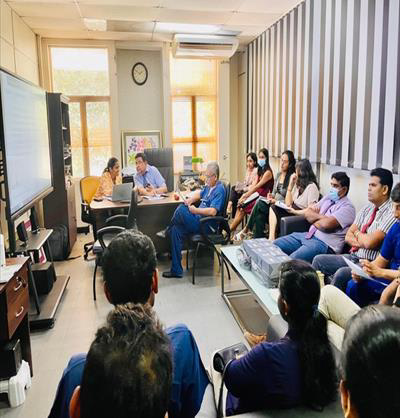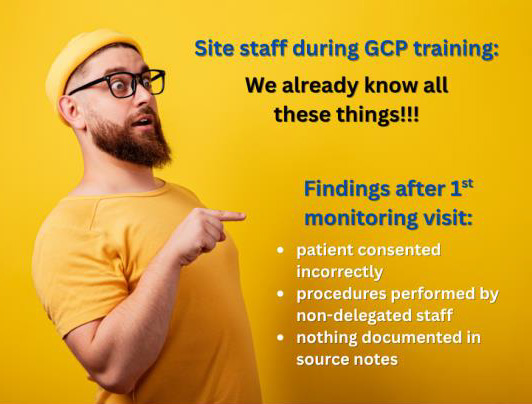Ensuring Clinical Trial Readiness through a Comprehensive Site Initiation Visit and Site Management During Ongoing Clinical Trial
By: INA-RESPOND CRA and CRSS
Site readiness is a cornerstone of successful clinical trial execution. The journey from site activation to ongoing trial management requires careful planning, clear communication, and continuous oversight. One of the most critical steps in this process is the Site Initiation Visit (SIV), which serves as the official launch of site activities and ensures alignment between the sponsor/ Contract Research Organization (CRO) and the site team. But the work doesn’t stop there—ongoing site management is essential to maintain protocol adherence, ensure subject safety, and uphold data quality throughout the study. These topic was presented during operational management training for the Clinical Research Unit team at Rumah Sakit Pusat Infeksi Prof. Dr. Sulianti Saroso (RSPI).
SITE INITIATION VISIT
SIV represents a crucial milestone in the successful commencement of a clinical trial from study planning and site execution. Conducted by sponsor or CRO, an SIV ensures that the site is fully prepared to begin participant enrollment. It usually follows a Site Preparation Visit (SPV), although both may be combined.
A SIV is scheduled once the Principal Investigator (PI) and clinical trial site team have fulfilled all regulatory and protocol requirements. The SIV should be attended by clinical trial site team members, and sponsor representatives such as Clinical Research Associates (CRAs) and/or Protocol Specialists and/or other relevant personnel. This may include the Clinical Site Specialist (CRSS), Data Manager (DM) and Laboratory Technician (LT) from Reference Laboratory, particularly when SIV is conducted along with a SPV.
The primary objective of an SIV is to align the clinical trial site team with study protocol, regulatory expectations, and Good Clinical Practice (GCP) standards. The visit confirms that all necessary infrastructure, staffing, and documents are in place, and that the clinical trial site team clearly understands their roles and responsibilities.

https://images.app.goo.gl/GEFJq3YkUtgUCqUR8
Key Objectives of an SIV
- Ensuring Site and Clinical Trial Site Team Readiness. The SIV confirms that the staffing, infrastructure, equipment, and systems are in place to conduct the trial effectively.
- Reinforcing Protocol Understanding. Key clinical trial site team members are trained on study rational, objectives, key procedures, timelines, and delegated responsibilities.
- Reviewing GCP and Regulatory Requirements. This ensures the all-site staff are well-informed about ethical standards, informed consent procedures, documentation standards, and participant protection guideline.
- Discussing Investigational Product (IP) Management. If the study involves an IP, the SIV provides clear guidance on IP logistics, including receipt, storage, accountability, dispensing, return, and destruction.
- Providing Training on Study Procedures. Depending on the site’s experience and familiarity with similar studies, the SIV may include role plays or mock scenarios or Question & Answer (Q&A) sessions to enhance understanding of specific study procedures.
- Planning for Recruitment and Enrolment. This includes setting realistic recruitment targets, identifying eligible patient pools, discussing potential barriers, and planning outreach activities where relevant.
- Reviewing Essential Documents. The SIV includes a review of essential study documents, such as ethics committee approvals, protocol versions, site contracts, training logs, delegation logs and Site Regulatory Binder (SRB). These documents must be available, accurate, complete, and organized.
- Final Confirmation for Identifying and Addressing Potential Barriers. Before the clinical trial begins, the SIV offers a chance to discuss and troubleshoot any possible issues that might hinder site performance, such as limited staffing, unclear procedures, or logistical concerns. Early identification allows for timely mitigation strategies. If there are any outstanding action items, a clear follow-up plan is agreed upon to resolve them.
Conditions for SIV Waiver
Under specific circumstances, an SIV may be waived. A waiver is only acceptable if an SPV has already been conducted properly, and all critical elements—such as site readiness, infrastructure assessment, staff qualifications, and documentation—have been adequately verified during the SPV. The decision to waive the SIV must also ensure that the site is fully trained, compliant with the study protocol, and capable of initiating study activities without additional risk to data quality or participant safety. This can occur upon a formal request from the sponsor or if the site has:
- Previously participated in studies with the same sponsor; or
- Received essential study-specific training during an Investigator Meeting.
Such waivers must be properly documented and archived in accordance with regulatory and institutional requirements. To formalize this process, an SIV Waiver Form must be completed to formally record the rationale and approval for the waiver.
SIV Preparation Requirements
Preparation for an SIV requires extensive documentation and logistical arrangements, including but not limited to:
- Independent Review Board (IRB)/Independent Ethics Committee (IEC) approvals for all study documents.
- Clinical trial approvals and/or import permits from the Indonesian Food and Drug Authority/Badan Pengawas Obat dan Makanan (BPOM).
- Updated Curriculum Vitae (CVs) and valid GCP certificates for all site staff.
- Hospital or laboratory accreditation documents.
- Signed contracts and institutional registrations (e.g., Clinical Trial Agreement (CTA), International Organization of Regulatory Guideline (IORG), Federalwide Assurance (FWA)).
- Confirmation of IP delivery and readiness if applicable.
- Finalized SRB (essential document) and relevant agenda templates.
Onsite vs Remote SIV: Criteria and Considerations
The SIV may be conducted either onsite or remotely, based on sponsor and/or CRO decisions. While traditional SIVs are conducted onsite, remote SIVs are now a practical alternative. A remote SIV may be considered if:
- The site has previous experience with other studies conducted by the same sponsor.
- The clinical trial site team is adequately trained and experienced.
- All documentation and facilities are prepared.
This approach can save time and resources while maintaining the integrity, compliance, and participant safety that are central to every clinical trial. Regardless of the format, the session typically involves:
- Introduction and Opening Remarks
- Protocol and Study Design Review
- GCP and Regulatory Compliance
- IP Management (if applicable)
- IP Management (if applicable)
- Monitoring Plan
- Essential Document Review
- Q&A session and Final Clarifications
Post-SIV Activities and Site Activation
Post-visit, the CRA prepares a detailed SIV Report and Site Action Item Tracking Log, which are distributed to the PI, sponsor, and CRO.
Any pending item identified during the SIV should be resolved and completed. Once addressed, the CRSS updates the Site Preparation Visit Checklist. When all requirements are fulfilled, the checklist is signed by the PI, sponsor, and CRO. The CRSS will then issue a Site Activation Email, officially confirming that the site is activated and may begin screening and enrollment. Completion of all action items is mandatory before site activation.
A well-executed SIV is a critical milestone that sets the tone for a successful trial. With proper preparation and follow-through, it ensures that the site operates in full alignment with study objectives, regulatory expectations, and participant safety standards.
SITE MANAGEMENT
Effective Site Management During Ongoing Clinical Trials
In every clinical trial, day-to-day operations at the site level are the engine that keeps the study moving forward. Within the INA-RESPOND network, site management is a collaborative effort between clinical trial site teams and the Clinical Research Site Specialist (CRSS), ensuring that everything from participant visits to documentation is handled efficiently and in full compliance with study protocols.
As trials progress, site teams are deeply involved in core activities like screening, enrollment, and follow-up visits. Behind the scenes, CRSS provides essential operational support. This includes organizing training, compiling weekly progress reports, conducting regular and on-demand calls, supporting monitoring visits, managing IRB/IEC/regulatory submissions, and keeping the EDMS organized and audit-ready.
Strengthening Communication
Regular operational calls bring together site staff, core study teams, and the Secretariat to discuss updates, challenges, and any changes to study documents. Meanwhile, weekly Screening Progress Reports compiled from site-submitted logs track recruitment and keep the momentum going across all sites. Urgent issues? CRSS and site Research Assistants (RAs) connect through on-demand teleconferences for quick resolutions, all recorded and stored for future reference.
Ongoing Training and Team Transitions
Maintaining a trained and compliant site team is key. CRSS coordinates ongoing training, including updates for protocol amendments. Missed a session? The PI/Co-PI or RA ensures the information is shared and documented. For new team members, the process includes submitting required credentials (CV, GCP certificate, license), granting EDMS access after training, and revoking access for outgoing staff to maintain system integrity.
Logistics, Shipments & Supplies
Specimen shipment coordination starts at the site, with RAs submitting shipment details to the Secretariat. From there, the Reference Lab and Finance & Procurement team handle pick-ups and documentation. Similarly, study supply reshipments are processed within 10 working days using a standardized request form, ensuring no disruption to site operations.
Regulatory & Documentation Oversight
Sites are responsible for reporting SAEs, Unexpected Problems, and protocol deviations to IRB/IEC. CRSS supports these efforts and also ensures timely submission of related reports and amendments to BPOM, with all records maintained in the SRB and EDMS. The CRSS also ensures proper file naming and accurate placement within the EDMS to keep all documentation organized, compliant, and inspection-ready.

In summary, effective site management is a multi-layered process, driven by teamwork, training, coordination, and attention to detail. By maintaining clear communication and compliance-focused operations, site teams and CRSS help ensure the success of every study conducted within the INA-RESPOND network.
Notes: GCP training gives a good start, but the real work begins at the SIV and after. The SIV helps the clinical trial site team learn the study rules and their jobs before they begin. Even with training and SIV, problems like incorrect patient consent, tasks done by the wrong person, or missing notes can happen at the first monitoring visit. That’s why it’s important to give clear instructions, keep checking the work, and offer support to make sure the study is done correctly and follows the rules.
Leave a reply
Most Commented